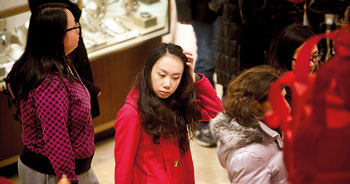NEW YORK - As turmoil stalks America's financial markets and protests fill its streets, Americans' lifestyle choices are evolving in a telling way: once seen by the rest of the world as an exuberant teenager - the globe's extrovert, exporter of rock 'n' roll and flashy Hollywood movies -- Americans are now becoming decidedly withdrawn, or at least inward-looking. Trends in leisure activities reflect that change: frugality and making do are in; gaudy consumerism is out.
This change is due to the fragile economy, of course, but I believe that it is also psychological. After two wars and a half-dozen undeclared conflicts in the past decade, America has entered a period of unprecedented cultural hibernation.
Gardening, scrapbooking, knitting, and cooking have all become newly, shabbily chic. In the urban neighbourhoods to which the young and hip are moving, city garden plots and heirloom tomatoes grown in window boxes have replaced Lexuses and Priuses.
 |
| Bargain hunters shop for discounted merchandise at Macy's on 'Black Friday' on November 25, 2011 in New York City. Marking the start of the holiday shopping season, 'Black Friday' is one of American retailers' busiest days of the year. Michael Nagle/Getty Images/AFP |
Other young hipsters have moved farther out into the country in search of an idyllic new narrative fantasy. The young couple -- he with a beard and she in a sundress and rubber boots -- are homesteading in the Hudson River Valley with a flock of chickens, or in New Mexico in an ecofriendly straw-bale house. They have replaced the young couple of five years ago -- he with the hedge fund, she with interior decorators -- in a McMansion in Westchester County.
The food sections of urban newspapers that, five years ago, would have covered the latest fusion cuisine, now run dreamy profiles of the guy with the Ivy League degree who has stepped off the grid, and done fine for himself by starting a line of homemade pickles. Farmers' markets, wood stoves, solar panels, and Agway farm-supply stores are the new focus of aspirational dreams for people who not long ago were high on boundless credit, consuming luxury brands scaled down for the middle class, and fantasizing about the kind of life on display in glossy magazines.
Even Hollywood story lines now echo this desire to escape to a "simpler life," with its aversion to excessive wealth and indulgence. In the soon-to-be-released "We Bought a Zoo," a single father heals his family by moving to the country and homesteading with a menagerie of wild animals - shabby house and spectacular natural vistas guaranteeing a redemptive setting for domestic life.
Other films cast excess as nauseating. The blockbuster "The Hangover Part II" depicts three young male friends engaged in a night of carousing in Thailand, in which they are free to satisfy every appetite -- from transsexual sex workers to drugs and chaos of all kinds. At the end, however, the lead character indulges his longing for marriage, family, and the quiet life of a dentist. In a parallel plot aimed at women, the movie "Bridesmaids" features a bride-to-be who is about to get "everything" -- in the guise of a dull but extremely affluent groom -- but flees the excess around her and escapes to her humble apartment.
After bank bailouts, Bernard Madoff-type financial scandals, and a housing bubble that left Americans high and dry, it is as if the collective unconscious is recasting life on yachts and perfectly manicured golf courses as distasteful, and thrifty, often rural simplicity as a virtuously cleansing relief.
Not surprisingly, the last time American culture had such a reversal of iconography was during the Great Depression, when films like "The Grapes of Wrath" cast down-to-earth simplicity -- versus the corruption of wealthy elites -- as a shining virtue. ("Whenever there's a cop beating up a guy, I'll be there….wherever people are eatin' the stuff they raise and livin' in the houses they build, I'll be there, too," as Tom Joad said).
Ronald Reagan asserted in 1980 that it was "morning in America," but in America now, it is the morning after. This drive toward an off-the-grid, eat-what-you-raise, bike-there-on-your-own, solar-powered collective fantasy is inevitable: Americans were pumped full of hope that more consumption would make them happier, and instead were left with a pile of debt. They were asked to admire the top of the income pyramid, only to find that they were looking at a pyramid scheme.
It is no wonder, therefore, that a kind of survivalist chic has become the updated version of the radical, communal chic of the 1960s. Americans have lost their faith in those who, in the boom times, purred, "Trust us." The new American dream — a flock of chickens and a jar of pickles — represents the insight that the only people whom Americans can trust in a crisis are themselves.
Naomi Wolf is a political activist and social critic whose most recent book is Give Me Liberty: A Handbook for American Revolutionaries.
Copyright: Project Syndicate, 2011. Exclusive to the Sunday |


